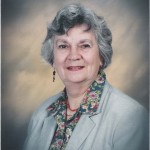The Boston Classicists and Organ Music in the Gilded Age
Serious organ music, for church and concert, did not begin to flourish in America until the 1850s and 1860s. The early leaders were New Englanders trained in Europe during that time. They and their students were part of a movement which, abetted by the prosperity that flourished in the postwar wake of territorial expansion, resulted in expanded music appreciation, the founding of conservatories, and the building of large concert halls and churches outfitted with modern organs. Buck, Paine, Chadwick, Foote, and Parker are known today as mainstream composers; this workshop investigates their impact on organs, organ music, and pedagogy.
Barbara Owen holds degrees in organ performance and musicology from Westminster Choir College and Boston University. She is author of numerous articles, entries in The New Grove Dictionary of Music, and books, including The Organ in New England, E. Power Biggs: Concert Organist, The Registration of Baroque Organ Music, The Organ Music of Johannes Brahms, and The Great Organ of Methuen. She was Music Director of the First Religious Society of Newburyport (1963–2002) and Librarian of the AGO Organ Library at Boston University (1985–2012), and is currently active as organist, lecturer, and consultant. A former AGO regional councillor and dean of two chapters, she is past president of the Organ Historical Society and a trustee of Methuen Memorial Music Hall. Honors include the American Musical Instrument Society Curt Sachs Award, the Westminster Choir College Alumni Merit Citation, the Max Miller Book Award, and the Organ Historical Society Distinguished Service Award.

